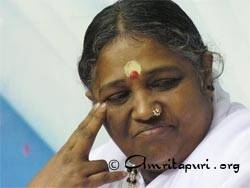16 August 2005 — Amritapuri

“It is impossible to say exactly when Vedic culture began,” Amma told the devotees and disciples gathered for Tuesday’s meditation and question-and-answer session. “The Vedas are anadi [without beginning]; they were there even before the beginning of the human race. The Vedas are said to be isvara nisvasam–the exhalation of God. We don’t even know who discovered them. To say exactly when the Vedas came into existence is difficult.”
Amma was responding to two questions by a Western devotee regarding the origin of the Vedic culture: When did the Vedas come into existence and where did the culture associated with them come from?
“The time of the Vedas cannot be stated,” Amma continued. “Amma cannot produce any proof for this. It is like asking which came first, the chicken or the egg. It is beyond words. When the British were ruling India, they burned all the pramana granthas [validating texts] to ashes. And what they wrote in their place is what is being taught to the children today.”
As to where the Vedic culture took birth, Amma said that it is from India alone and not, as some scholars claim, brought to India by foreigners from over the Himalayan passes.
Amma then lamented the acceptance by many scholars and laymen that the Vedas were written some 5,000 years ago, and that that they and the Indian culture–including the Sanskrit language–were brought to India by nomadic tribes.
“There is no logic in that,” Amma said. “In India, Sanskrit is a spoken language. No other country has been using Sanskrit as a spoken language. Now, it is being taken by other countries and taught there. But it is spoken only in India. If nomads from another country had come to India and introduced the language, it should also have been a spoken language in their country of origin. That is not the case. Sanskrit is India’s. You will not find the knowledge of the Vedas in other countries or languages.”
Amma then recounted a popular legend that is a testament to the Vedic culture’s origin in India. The story has it that Alexander of Macedonia, who invaded India in 326 B.C., was asked by Aristotle, the general’s preceptor, to bring him back a yogi when he returned, as Aristotle wished to study from one. The legend implies that as long as 2,300 years ago, India was renowned as a source of rare and great wisdom.
Amma said that there is a lot of miseducation in Vedic studies due to the way that the Vedas are being taught today. Traditionally, the Vedas and their teachings were taught in a gurukula system, orally passed down through the guru-disciple parampara [lineage]. Now, that tradition is all but lost, and the vast majority of Vedic scholars have gained their knowledge through textbooks in translation, motivated by academic curiosity rather than a thirst for the Truth.
Amma gave a telling example of this miseducation: the interpretation of the Sanskrit word “pashu.” The most common meaning, indeed, is “cow,” but the word also has many other meanings including “ego.” So, in some Vedic rituals it says to sacrifice a “pashu”; although the correct meaning is to end your identification with the limited sense of “I,” in most Western universities it is being taken as to kill a cow.
Many of these mistakes originated with Max Müller, a German philologist and Orientalist who translated the Rg Veda, the major Upanishads and wrote various works on Hindu culture–without once having visited India. As Müller was the first person to translate much of the Vedic literature into English, his texts became the primary source of reference.
Perhaps the biggest tragedy is that Indians today are accepting these fallacies as fact, Amma said. Even though Mahatmas are correcting these misconceptions and pointing out the real meaning of the scriptural statements, most people are not able to accept what the Mahatmas are saying as the real truth. Instead, they cling to the belief that whatever they were taught in school—from textbooks based on the writings of Müller and other Western scholars—must be correct. Amma said that one of the reasons for this is that as the Indian people were living in slavery under the British for nearly 200 years, they have developed the attitude to accept whatever the West says.
Amma then told a story to illustrate the condition of India: Once a king ate some payasam [sweet rice pudding] and, not wanting his subjects to have any, told all of them that it was bitter. All the subjects, out of respect for the king, did not even taste the payasam, accepting its bitterness as a fact. But there was one smart fellow in the court, and he said, “I like bitter payasam,” and took all of it.
The story is symbolic of how certain forces have been able to trick the majority of people into forfeiting the Vedic culture that is their birthright. However, even so, the truly inquisitive seekers of knowledge have pushed forward anyway, found out the sweetness of India’s spiritual tradition for themselves and embraced it.
But Amma said some of the blame also falls on Indian people themselves; that there were some Indian pundits who sold the knowledge contained in the Vedas to foreigners just to make money, often helping them to misinterpret or pretending to know the meanings when they really did not. This was the beginning of the proliferation of misinformation. “In this way, too many of India’s precious things were lost,” Amma said.
“Westerners are very keen to come and explore and investigate the origin of the knowledge, but Indians are not interested in this,” Amma said, adding that, seeing the knowledge’s value, Westerners take it back to their own countries and patent it, but that the Indians never see its value. Amma then wondered aloud: “All our books have commentaries written by Westerners. Indians haven’t written that much. Why is it like this?”
–KaliCharan
